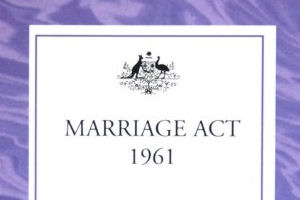What Does The Marriage
Act Do?
Categories: | Wedding Ceremony | Wedding Legals |
 All
marriages in Australia are subject to the requirements
of the Marriage Act. It doesn't matter if you are
married by a civil celebrant, in a religious ceremony
officiated by an ordained member of the clergy, by an
employee in the Registry Office or Court, or by a
Defence Force chaplain. The Marriage Act applies to
all of them
All
marriages in Australia are subject to the requirements
of the Marriage Act. It doesn't matter if you are
married by a civil celebrant, in a religious ceremony
officiated by an ordained member of the clergy, by an
employee in the Registry Office or Court, or by a
Defence Force chaplain. The Marriage Act applies to
all of themSo what does the Marriage Act actually do?
The Marriage Act sets the
marriageable age
The Marriage Act establishes
the framework for marriage ceremonies
Religions which have been recognised as requiring monogamy and permanency as promises of marriage are permitted to use their own ceremony.
The Marriage Act establishes
the framework of regulation of celebrants
The Marriage Act deals with
issues of consent, void marriages, and legitimacy of
children
The Marriage Act creates
offences
The Marriage Act defines the
legal meaning of marriage
The Marriage Act deals with
the recognition of foreign marriages
What does the Marriage Act
not do?
- what you wear
- the venue
- a bride to be 'given away'
- you have rings
- you to kiss
- anyone to promise to obey
More information
Thanks for reading!

Yes, it will